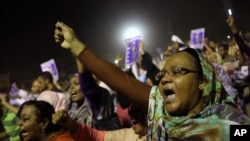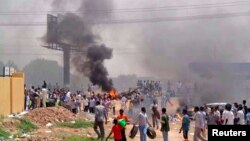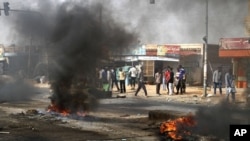JOHANNESBURG —
Humanitarian leaders and activists say Sudan is on the edge of a crisis, with three conflicts raging and discontent bubbling over into what they hope could be a "Sudanese Summer," like the Arab Spring revolutions that saw longtime leaders pushed out of office. Such discontent has risen up before, only to die down before with President Omar al-Bashir remaining in power.
The desert nation of Sudan experiences high temperatures and little rain. For that reason, there is no such thing as Sudanese spring.
But, Sudanese activists say, the political temperature is rising over the longtime rule of a hardline regime whose leaders have been accused of war crimes and crimes against humanity.
This discontent could lead to what activists are describing as Sudanese Summer -- a political uprising similar to the Arab Springs that rocked Middle Eastern nations.
Protests in September and October in the capital, Khartoum, presented fresh challenges to the government of al-Bashir, who has ruled Sudan since he took power in 1989 military coup.
al-Bashir's forces responded to the marches by cracking down on protesters, arresting critics and imposing a blackout on the media.
Osman Hummaida, director of the Kampala, Uganda-based African Center for Justice and Peace Studies, says Sudan's people have toppled two governments before -- in the 1960s and 1980s -- and are capable of doing it again.
"Because the mobilization is massive, they know that the will of the people are increasing, and we hope we'll see a Sudanese Summer uprising sooner or later," said Hummaida.
Albaqir Mukhtar, head of a Sudanese civil society group that was closed down last year by the government and now works out of Uganda, says the conflict has one root cause.
"Indeed, now Sudan is run by a bunch of hardliners who are determined to maintain themselves in power at any cost, whether it is human life or property," said Mukhtar.
The protests come against the backdrop of three major, simultaneous conflicts in Sudan: the Darfur conflict, where rebels have fought the government since 2003; in Blue Nile state, where aid groups say at least 200,000 people have been caught in an unbalanced battle between rebels’ small arms and the regime’s fighter jets; and in South Kordofan state where the president recently threatened the “final elimination” of all rebels opposing his regime.
For humanitarian worker Nagwa Konda, head of the Nuba Relief, Rehabilitation and Development Organization, this unrest takes a very real toll.
She described the horrifying calculations that people in Blue Nile state have to make on a regular basis -- especially since she says her group has found that the regime has switched from slow, low-flying attack planes to jets.
"So when you see the Antonov coming, you have time to hide in the foxhole or run to the cave. Now during the last month -- the last month or last couple of months -- we have realized that the aircraft that is used is different," said Konda. "Once you hear the noise, it's already over your head. So you don't have actually time to run and hide in the foxhole or somewhere, so you'll just be compelled to lay down where you are."
For all of the turmoil in Sudan, the fact remains that President Bashir and his party have managed to stay in power for nearly a quarter-century, and have weathered many crises before, including the secession of South Sudan in 2011.
The activists say they will not continue to take this situation lying down. They called on the international community to intervene to help stop the conflicts in Sudan, and say they plan to lobby the African Union at their annual summit in January.
The desert nation of Sudan experiences high temperatures and little rain. For that reason, there is no such thing as Sudanese spring.
But, Sudanese activists say, the political temperature is rising over the longtime rule of a hardline regime whose leaders have been accused of war crimes and crimes against humanity.
This discontent could lead to what activists are describing as Sudanese Summer -- a political uprising similar to the Arab Springs that rocked Middle Eastern nations.
Protests in September and October in the capital, Khartoum, presented fresh challenges to the government of al-Bashir, who has ruled Sudan since he took power in 1989 military coup.
al-Bashir's forces responded to the marches by cracking down on protesters, arresting critics and imposing a blackout on the media.
Osman Hummaida, director of the Kampala, Uganda-based African Center for Justice and Peace Studies, says Sudan's people have toppled two governments before -- in the 1960s and 1980s -- and are capable of doing it again.
"Because the mobilization is massive, they know that the will of the people are increasing, and we hope we'll see a Sudanese Summer uprising sooner or later," said Hummaida.
Albaqir Mukhtar, head of a Sudanese civil society group that was closed down last year by the government and now works out of Uganda, says the conflict has one root cause.
"Indeed, now Sudan is run by a bunch of hardliners who are determined to maintain themselves in power at any cost, whether it is human life or property," said Mukhtar.
The protests come against the backdrop of three major, simultaneous conflicts in Sudan: the Darfur conflict, where rebels have fought the government since 2003; in Blue Nile state, where aid groups say at least 200,000 people have been caught in an unbalanced battle between rebels’ small arms and the regime’s fighter jets; and in South Kordofan state where the president recently threatened the “final elimination” of all rebels opposing his regime.
For humanitarian worker Nagwa Konda, head of the Nuba Relief, Rehabilitation and Development Organization, this unrest takes a very real toll.
She described the horrifying calculations that people in Blue Nile state have to make on a regular basis -- especially since she says her group has found that the regime has switched from slow, low-flying attack planes to jets.
"So when you see the Antonov coming, you have time to hide in the foxhole or run to the cave. Now during the last month -- the last month or last couple of months -- we have realized that the aircraft that is used is different," said Konda. "Once you hear the noise, it's already over your head. So you don't have actually time to run and hide in the foxhole or somewhere, so you'll just be compelled to lay down where you are."
For all of the turmoil in Sudan, the fact remains that President Bashir and his party have managed to stay in power for nearly a quarter-century, and have weathered many crises before, including the secession of South Sudan in 2011.
The activists say they will not continue to take this situation lying down. They called on the international community to intervene to help stop the conflicts in Sudan, and say they plan to lobby the African Union at their annual summit in January.






